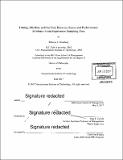Timing, mindset, and the link between stress and performance : evidence from experience sampling data
Author(s)
Grunberg, Rebecca L
DownloadFull printable version (6.328Mb)
Other Contributors
Sloan School of Management.
Advisor
John S. Carroll.
Terms of use
Metadata
Show full item recordAbstract
This dissertation examines external stressors, perceived stress, and performance, using daily experience sampling data from undergraduate students during their final exam week. First, I investigate external stressors and the timing of perceived stress. Consistent with prior literature, I find that overall perceived stress negatively predicts semester GPA. However, looking more closely at perceived stress over time, I find that perceived stress on exam days did not predict semester grade point average (GPA), while perceived stress on non-exam days significantly negatively predicted semester GPA. Those individuals who experience high perceived stress even outside the temporal bounds of external stressors never have time to recover from the exertion of coping with stress. Then, once individuals feel stressed, one factor that may change how they respond is their beliefs about whether stress is enhancing or debilitating. I investigate the effects of these stress mindsets on the relationship between stress and performance. Results show that stress mindset moderates the relationship between stress and performance, such that the relationship between stress and performance is more negative the more individuals endorse a stress-is-debilitating mindset. I also provide evidence that this effect is partially explained by stress mindset's moderating effect on the relationship between stress and motivation. Together, these findings show that a more complete understanding of the relationship between stress and performance requires examination of both external stressors and perceived stress. Experience sampling methods such as used here provide the opportunity to study all of these variables. This research also has practical implications. Traditional stress management techniques that focus solely on reducing stress may be inadequate at best; both the timing of perceived stress relative to external stressors and individuals' stress mindset provide promising avenues for intervention.
Description
Thesis: Ph. D., Massachusetts Institute of Technology, Sloan School of Management, 2017. Cataloged from PDF version of thesis. Includes bibliographical references (pages 86-92).
Date issued
2017Department
Sloan School of ManagementPublisher
Massachusetts Institute of Technology
Keywords
Sloan School of Management.